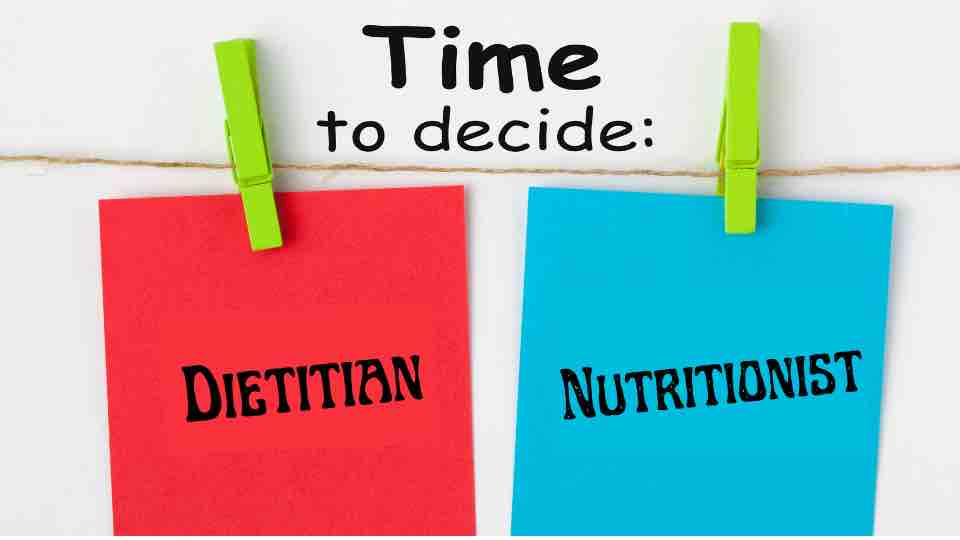Diet plays an essential role in achieving and maintaining good health.
Following a balanced diet is key to maintaining a healthy weight and reducing the risks of many diseases.
Those who have medical problems should pay special attention to their diet, as nutritional needs can change with certain medical conditions, and these needs can impact recovery and well-being.
People seeking professional advice on how to follow the best diet often seek the help of dietitians or nutritionists, but many times do not understand the differences between these two roles and the different ways that dietitians and nutritionists can help.
Let's cover the main differences between dietitians and nutritionists...
What is the Difference Between Dietitians vs Nutritionists?

Dietitians and nutritionists are not the same thing, and the qualifications for each role are different. Dietitians ultimately face stricter requirements and have more guaranteed expertise than nutritionists.
In the United States, dietitians are required to be certified by the Academy of Nutrition and Dietetics, a national organization that provides professional credentials to dietitians.
Anyone who calls themselves a dietitian is legally required to be credentialed and licensed by their state to do so, just like a medical doctor must be credentialed by their state board of medicine to call themselves a doctor.
Nutritionists typically do not have the same requirements that dietitians face.
While some states require that nutritionists be certified in order to call themselves nutritionists, others do not.
This means that someone could call themselves a nutritionist without actually having expertise or formal training in this area.
Dietitians

Dietitians must earn the credential of Registered Dietitian (RD) or Registered Dietitian Nutritionist (RDN) to call themselves a dietitian. These two credentials are interchangeable, and there is no difference between them.
In order to become an RD, there are several requirements that a dietitian must meet.
They must:
- Complete a bachelor’s degree or higher level of education studying dietetics (the study of diet and nutrition) at an accredited school.
- Complete at least 1,200 hours of supervised practice through a dietetic internship. This is the equivalent of 150 eight-hour days.
- Pass a national exam assessing dietetic knowledge.
Dietitians work in many different settings. These include:
- Hospitals
- Clinics
- Sports organizations
- Corporate wellness programs
- Food or nutrition industries
- Private practice
- Universities
- Research
Many of these areas require that someone working in a nutrition-related role be a registered dietitian.
Hospitals and other healthcare settings especially require official RD credentials to work with patients.
Dietitians are specially trained and authorized to provide medical nutrition therapy (MNT).
This form of therapy is covered under Medicare in some situations and is a type of medical therapy that dietitians can provide.
MNT is used in people who have diabetes, chronic kidney disease, or have had a recent transplant. MNT can also be used to help treat certain eating disorders.
Beyond MNT, dietitians help people seeking medical care to make dietary choices that help to optimize their health while still fitting their lifestyle needs.
RDs will formulate personalized diet plans that will actually work for specific people, helping them to still eat the foods they enjoy while also achieving a healthy lifestyle.
Nutritionists

Nutritionists, on the other hand, are individuals who provide advice on nutrition and diet to others; however, professional credentials may not be required to refer to yourself as a nutritionist.
Ultimately, anyone who is a dietitian can call themselves a nutritionist, but not everyone who is a nutritionist can call themselves a dietitian.
In some states, there are requirements that someone must meet to use the title “nutritionist”.
In others, anyone can call themselves a nutritionist, even if they have no formal training or experience in this area.
Most people who call themselves nutritionists, however, have had some educational experience in learning about nutrition and how it affects the body.
This education may come from mainstream academic sources or from sources that are not widely held as accurate by mainstream scientists.
While the title “nutritionist" may not have as much meaning as “dietitian”, there are two certifications that nutritionists can receive that indicate a certain level of expertise as a nutritionist.
- Certified clinical nutritionist (CCN) - The CCN certification is provided by the Clinical Nutrition Certification Board and requires that the person holding the certification have a bachelor-level or higher education in a nutrition-related discipline and pass an examination. Anyone with a degree in a healthcare-related subject or a general science degree with certain courses is generally eligible for this certification.
- Certified nutrition specialist (CNS) - Provided by the Board for Certification of Nutrition Specialists, this certification requires a masters-level education or higher, at least 1,000 hours of supervised practice, and passing an exam.
The CNS certification is generally harder to obtain and indicates a higher level of expertise than the CCN certification.
Dietitians vs Nutritionists - Which is Better?

Ultimately, dietitians are generally more qualified than nutritionists to provide medical-level diet advice.
Someone calling themselves a nutritionist may or may not have the expertise necessary to provide useful nutritional advice. If using a nutritionist instead of a dietitian, you should check if they are certified as a CCN or a CNS.
Meet Our Dietitian
Noorani Medical Center provides a registered dietitian in Riverview who will help you to optimize your nutrition to meet your unique health needs while still being able to follow a diet that works best with your lifestyle.
We invite you to contact us to learn more about how our dietitians can help you achieve optimal health through improved nutrition.
